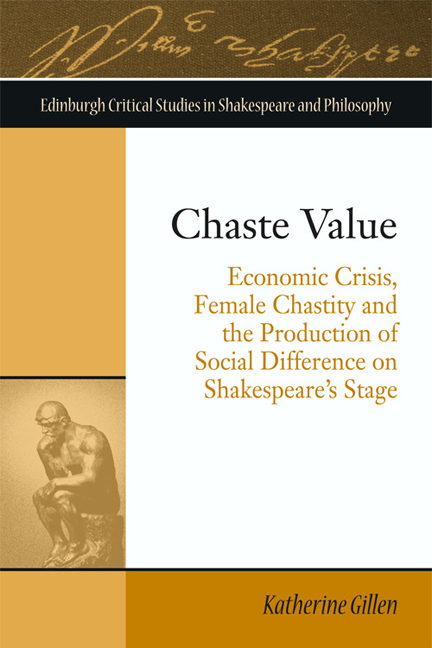 Chaste Value
Chaste Value Book contents
- Frontmatter
- Contents
- Acknowledgements
- Series Editor's Preface
- Introduction: Chastity and the Question of Value
- 1 Chastity and the Ethics of Commercial Theatre in Measure for Measure, Pericles and The Revenger's Tragedy
- 2 Commercial Chastity and Aristocratic Value in Troilus and Cressida, The White Devil and The Changeling
- 3 Chaste Selfhood: Ben Jonson's Critique of Urban Chastity Tropes
- 4 Chastity and Blackness: Racial Value and Commodity Potential in The Fair Maid of the West, Part I and Othello
- 5 Mediterranean Markets, Commoditised Masculinity and the Whitening of Christian Chastity in The Merchant of Venice and The Renegado
- 6 Chaste Treasure and National Identity in The Rape of Lucrece and Cymbeline
- Coda: Approaching Capitalist Modernity
- Index
Coda: Approaching Capitalist Modernity
Published online by Cambridge University Press: 22 December 2017
- Frontmatter
- Contents
- Acknowledgements
- Series Editor's Preface
- Introduction: Chastity and the Question of Value
- 1 Chastity and the Ethics of Commercial Theatre in Measure for Measure, Pericles and The Revenger's Tragedy
- 2 Commercial Chastity and Aristocratic Value in Troilus and Cressida, The White Devil and The Changeling
- 3 Chaste Selfhood: Ben Jonson's Critique of Urban Chastity Tropes
- 4 Chastity and Blackness: Racial Value and Commodity Potential in The Fair Maid of the West, Part I and Othello
- 5 Mediterranean Markets, Commoditised Masculinity and the Whitening of Christian Chastity in The Merchant of Venice and The Renegado
- 6 Chaste Treasure and National Identity in The Rape of Lucrece and Cymbeline
- Coda: Approaching Capitalist Modernity
- Index
Summary
The plays discussed in Chaste Value respond to a sense that early capitalist forces destabilise the primacy of intrinsic personal value, which was fundamental to the aristocratic order. Tragedies such as The Revenger's Tragedy, The White Devil and The Changeling underscore capitalism's disruptive power, suggesting that shifting social hierarchies and commercial modes of evaluation engender both sin and personal fragmentation. A fully performative self emerges from this context, yet proves incapable of ethical action. Plays such as Othello draw out the racial implications of this commoditised performativity. Iago's proclamation ‘I am not what I am’ (I, i, 64) signals the alienation and emptiness of the commoditised self; when he displaces these characteristics onto Othello, he paints black bodies as susceptible to a particularly abject form of commoditisation that involves objectification rather than performativity. City comedies, by contrast, work to accommodate new capitalist realities, acknowledging overlapping sexual and commercial economies and drawing on female chastity to articulate new modes of selfhood. Rather than embracing this constructed selfhood, tragicomic romances such as The Merchant of Venice, The Renegado and Cymbeline recuperate intrinsic personal value from market-based logics, in part as a means of restricting the exchange of women in multicultural environments. Such intrinsic value, however, is largely reserved for middle- and upper-class white Christians and is not extended to workers, the poor, racial and religious others, or those marked by nonnormative sexual identities.
In their use of chastity to explore questions of value, subjectivity and commoditisation, early modern plays register many of modernity's foundational social and epistemological trends. They contribute to the development of homo economicus, the economic subject who must balance an interior reality against a host of external markers, including wealth, status and appearance. The viable economic subject, a play such as Bartholomew Fair indicates, must learn to live with his or her commodity potential and conform to the transactional nature of urban, capitalist life. The drama's exploration of economic selfhood also informs the rise of possessive individualism. Plays ranging from Troilus and Cressida to The Fair Maid of the West, Part I suggest that some people are capable of managing or possessing themselves, while some are depicted as possessions or must accept that their labour power, sexuality and other attributes effectively belong to others.
- Type
- Chapter
- Information
- Chaste ValueEconomic Crisis, Female Chastity and the Production of Social Difference on Shakespeare's Stage, pp. 297 - 300Publisher: Edinburgh University PressPrint publication year: 2017


